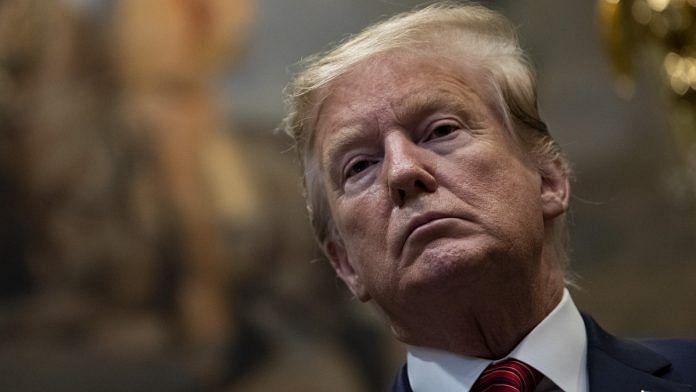New Delhi: When Pakistani authorities arrested Lashkar-e-Tayyiba (LeT) chief Hafiz Saeed Wednesday, US President Donald Trump tweeted that the action, to nab the alleged mastermind of the Mumbai attack, was the result of a 10-year search.
“After a ten year search, the so-called “mastermind” of the Mumbai Terror attacks has been arrested in Pakistan. Great pressure has been exerted over the last two years to find him!” Trump posted.
After a ten year search, the so-called “mastermind” of the Mumbai Terror attacks has been arrested in Pakistan. Great pressure has been exerted over the last two years to find him!
— Donald J. Trump (@realDonaldTrump) July 17, 2019
While the president has been mocked widely for the tweet, with many pointing out that Saeed was very much in the public eye in Pakistan, his assertion is also at odds with his own state department.
The US State Department, including under Trump, has time and again put out statements on Saeed, revealing that it is well aware of his whereabouts.
In 2017, when the Lahore High Court ordered the release of Saeed, whom Pakistani authorities had detained earlier that year, the state department, with Trump at the helm, expressed its “deep concern”. “The United States is deeply concerned that Lashkar-e-Tayyiba (LeT) leader Hafiz Saeed has been released…,” it said in a press release.
In a press briefing that followed a month later, Heather Nauert, spokesperson for the State Department, reiterated that there was $10 million dollar reward on Saeed’s head.
“Pakistan released him from house arrest, and now there is word that he may be running for some sort of office,” Nauert had then said. “I want to remind folks that we have a $10 million reward that is for information that would bring him to justice.”
“So I want to make that clear so that everybody knows, $10 million out for this guy, and we would certainly have concerns about him running for office,” added Nauert.
Also read: Hafiz Saeed’s arrest doesn’t mean much — he was held at least 7 times before
Not the only instance under Trump
The President’s tweet also suggests that he was unaware that his own state department had been flagging Saeed’s presence in Pakistan.
The US state department’s ‘Country Reports on Terrorism 2017’ notes that Pakistan had not taken “sufficient action” against the LeT. “Pakistan did not take sufficient action against other externally focused groups such as Lashkar e-Tayyiba (LeT) and Jaish-e-Mohammad (JeM) in 2017, which continued to operate, train, organize, and fundraise in Pakistan,” the report said.
In 2018, the state department amended its 2001 executive order to include LeT’s front organisations, such as the Milli Muslim League (MML) and Tehreek-e- Azadi-e Kashmir (TAJK), on its sanctions list. “Make no mistake: whatever LeT chooses to call itself, it remains a violent terrorist group,” Ambassador Nathan A. Sales, the coordinator for counterterrorism, had then remarked. “The United States supports all efforts to ensure that LeT does not have a political voice until it gives up violence as a tool of influence.”
More recently, during US Secretary of State Mike Pompeo’s 2018 India visit, a senior state department official said during a press briefing, “Obviously, we share India’s concern that Pakistan continues to allow Hafiz Saeed, the mastermind of the Mumbai bombing, free, at-large, despite the reward that’s on his head and despite his very known role in helping to facilitate that attack.”
US actions against LeT and its chief over the years
The US has been aware of Saeed’s association with terror-related activities for nearly 18 years.
On 20 December 2001, the US Department of Treasury first designated Saeed as a “Specially Designated Global Terrorist”. Less than a week later, Saeed’s LeT was also listed as a “Foreign Terrorist Organisation”.
In what would become a recurring pattern, the US State Department kept on amending its 2001 executive order — to include affiliate organisations of the LeT on the sanctions list.
In 2006, the State Department included the “Jamaat-ud-Dawa” (JuD) and “Idara Khidmat-e-Khalq” as aliases of LeT. A few years later in 2010, the “Falah-i-Insaniat Foundation” (FIF) was listed as an alias of LeT by the Treasury Department. And then finally in 2018, the political arm of the LeT, the MML, and the TAJK, were also listed as aliases of the outfit.
Following the 2008 terrorist attacks in Mumbai, the US Treasury Department designated Saeed as “Specially Designated Global Terrorist” through “Executive Order 13224”. The US government also froze assets of other LeT leaders such as Zaki-ur-Rehman Lakhvi and Haji Muhammad Ashraf.
In 2012, the US offered a $10 million reward for “information that brings Saeed to justice”. It also announced a $5 million award for “information leading to the arrest or conviction of anyone who committed or assisted the horrific attack in Mumbai”.
Also read: Why the Pakistani deep state sponsors terrorism in India



